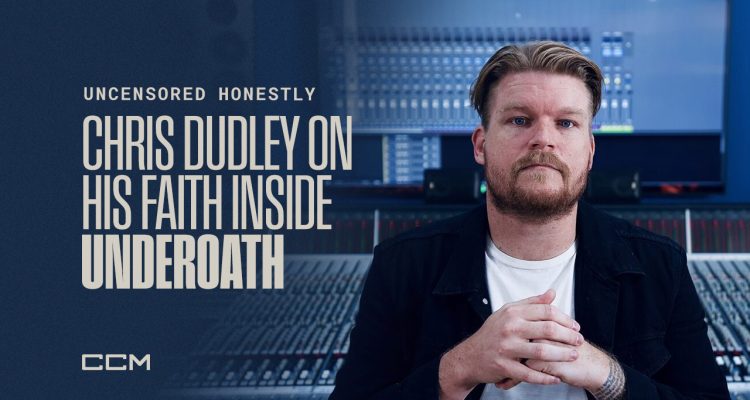“Personally, it was probably harder of a discussion than for some of the other dudes,” Dudley explained regarding the decision to step away from Christianity as a group. “All the dudes knew that I was still a believer, and a handful of other guys were as well. It was more so a thing of, personally, where do I see God putting me? Where am I able to do what I feel like I need to do?”
When Underoath first emerged as a defining force in Christian hardcore music over two decades ago, their aggressive yet spiritually introspective sound resonated deeply with teenagers around the world. They graced the cover of this very magazine in July of 2005. While blending crushing instrumentals with heartfelt lyrics, the band quickly built a dedicated fanbase. Those teenagers grew up, and so did the band. Perspectives changed, beliefs became blurrier. In 2018, the band made headlines by openly distancing themselves from the “Christian band” label, embracing a new creative identity—one unafraid of explicit lyrics and honest explorations of doubt and personal struggle.
Chris Dudley, the man behind the keys and the otherworldly sounds of Underoath, has been in the band nearly 27 years. Chris and I first connected over a mutual love of genre films and theme parks. He has composed numerous pieces for me for different film and TV projects, but it wasn’t until we took over CCM that our conversations began to morph. With the release of Underoath’s new record, The Place After This One, I approached him to candidly discuss the band’s evolution and his personal faith journey. Despite changes within the group’s collective beliefs, I knew that Dudley had remained steadfast as a “Christ follower”… at least according to his Instagram bio.
Dudley acknowledged that the band’s move away from the Christian music scene was fundamentally about honesty and integrity. “We had seen, you know, artists and bands… where it was very evident they didn’t really believe what they were saying… and we were just like, no way, dude. I’d rather do something else than get up on stage and say that we’re something that we’re not,” he said. “We knew we weren’t all on the same page when it comes to our faith and our beliefs,” he reflected. “For us to get up on stage and say that we’re all Christians and this is a Christian band—that’s not honest at all.”
Though Underoath’s lyrics now contain explicit language and themes, Dudley views his continued presence in the band as a personal calling. “I’m going to live my life the way I feel like God’s called me to live it, and I’m doing it here,” Dudley emphasized. He sees his role within Underoath as an authentic expression of that calling.
There is a search for clarity when it comes to how a band once known for their loud faith could take such a shift. Dudley acknowledged how public perception of the band’s views can sometimes misrepresent his own beliefs. “It’s funny because generally with press, you know, they want to talk to singers. That’s just kind of how it works,” he explained. “So, what I have found is it actually opened up a lot of interesting discussions.”
This journey toward authenticity and transparency is reflected in the band’s latest album, The Place After This One, which Dudley describes as their most openly collaborative work to date. “Historically, the lyrics were very personal between Aaron [Gillespie] and Spencer [Chamberlain], but this record involved all of us discussing the themes and connecting on deeper levels,” he explained. This creative synergy has resulted in an album Dudley describes as honest, introspective, and groundbreaking for the band. However, readers should be aware that The Place After This One is not a Christian album, and its lyrical content may not be suitable for all audiences.
Currently, Underoath is touring alongside Papa Roach and Rise Against, attracting a diverse audience. “Every night Spencer asks who’s seeing us for the first time, and it’s 90% of the crowd,” Dudley shared, emphasizing the band’s continued relevance and evolving fanbase. Underoath concerts today are filled not only with fans who have supported them for decades but also with young listeners discovering the band—and some teenage angst—for the first time.
Reflecting on a recent experience, Dudley said, “There was this kid at the show last night who’s probably eight years old, and he was in the front, and he had these big headphones on and, you know, I could tell he was just blown away. And after the set, I went down, I handed him a setlist, and I got a drum stick, and he was just, like, losing his mind.”
“I’m like, that’s crazy. He’s probably going to be our age at some point and be like, man, I remember I went and saw Underoath… and that’s just wild,” he added.
Away from the stage, Dudley takes great pride in his role as a father, emphasizing how important family has become over the years. He also reflected on the brief period when the band called it quits—what they believed at the time was the end of Underoath. That season, he explained, was less about burning out and more about choosing family over fame. “We kind of felt like we were in a position where we either had to choose between being present dads or being in a band,” Dudley said. “And faced with that choice that we felt like we had to make, all of the dudes that were dads were like, okay, well, we’d rather be present dads.”
After time away, the band realized the balance was possible. They returned in 2016 with a renewed sense of purpose and a healthier dynamic—one built on choice rather than obligation. His children have grown up alongside Underoath’s music, offering him unique and honest feedback. “This is probably the first record where I’m getting my kids’ opinions before it’s out. Normally in the past, it’s been like, ‘Oh, turn it off, Dad,’ because they’re not into it. But this time, most of them like it, which is new and kind of cool as a dad.”
Despite distancing themselves from the Christian music identity, Dudley asserts the band remains deeply connected to its roots and legacy. “To erase that [Christian background] would be disingenuous,” Dudley insisted. “Even the guys who aren’t believers anymore understand it’s who we were at that moment. We are who we are now, and we will always be an open book.”
Looking ahead, Dudley remains optimistic and deeply committed to the ongoing story of Underoath. He embraces the band’s past while looking forward to its future. “It’s all about being genuine,” he emphasized. “We are always going to tell you exactly who we are right now.”
Even after decades of touring and personal evolution, Chris Dudley’s heart remains anchored in a simple but powerful truth: the importance of living authentically. “For me, it’s all about just being as genuine as possible,” he said. “We are always just going to be who we are, and who knows if that’s going to be who we are in five, ten, 20 years—but we’re going to tell you who we are right now.”
That commitment to honesty—whether on stage in front of thousands or at home with his wife and kids—is what makes Dudley’s role in Underoath not just about the music, but about something deeper. Reflecting on the band’s dynamic today, Dudley shared a sentiment he’s voiced to his bandmates: “Even if we don’t agree on these things theologically… I love you guys and I love making music with you guys, and I love traveling with you guys. And I love what I still see God doing—whether it’s a conversation I’m able to have with somebody, or relationships that we’re able to have out on the road,” Dudley shared.
A quiet resilience. A chosen path. A steady light, even when everything around him is shifting.
Fair Warning: Readers should be aware that The Place After This One is not a Christian album, and its lyrical content may not be suitable for all audiences.


Leave a Reply
You must be logged in to post a comment.